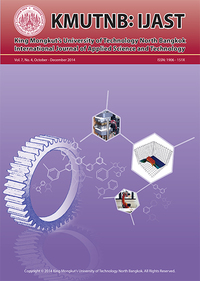Resistance Measurement of Conductive Thermoplastic Bipolar Plates for Polymer Electrolyte Membrane Fuel Cells
Main Article Content
Abstract
Electrical conductivity is one of the most important properties of bipolar plates (BPs). It is, therefore, important to identify possible factors that have a significant effect on bipolar plate electrical resistance measurement techniques. A method for measuring the resistance of conductive thermoplastic BPs for polymer electrolyte membrane fuel cells is described. The major goals of this research are to identify the factors affecting electrical resistance measurements. For BPs made of the same material, dimensional factors such as surface area, thickness and the ratio of surface area over thickness (S/T) could have significant effects on BP resistance measurements. Electrical contact resistance between a gas diffusion layer and a BP is another factor affecting the BP resistance measurement in addition to the surface area and S/T ratio. All these factors can affect the measured resistance and change the result even with the same material. External factors such as clamping pressure applied on the measured BP also reduce the interfacial contact resistance significantly.


